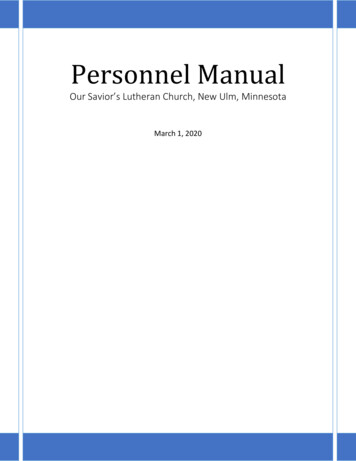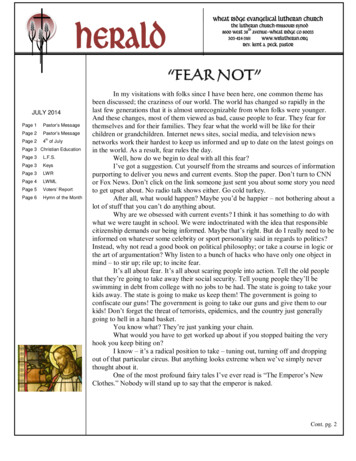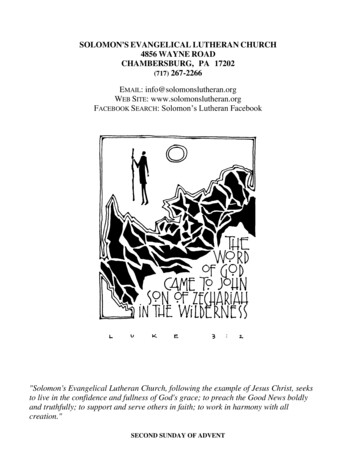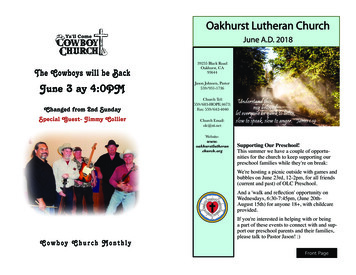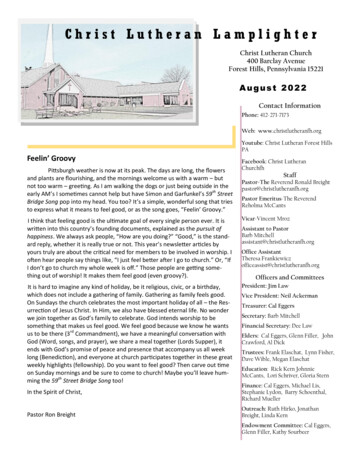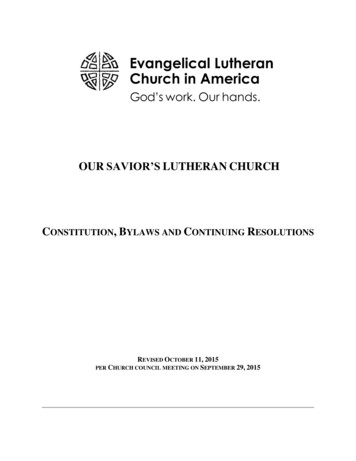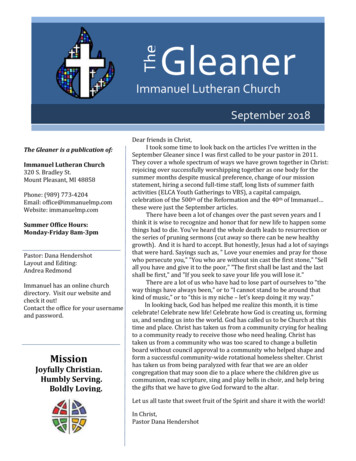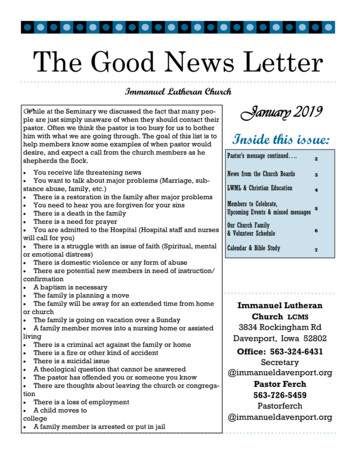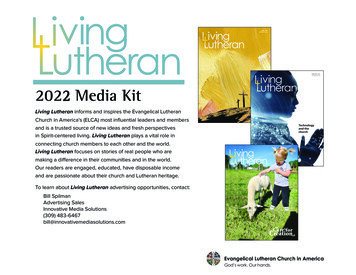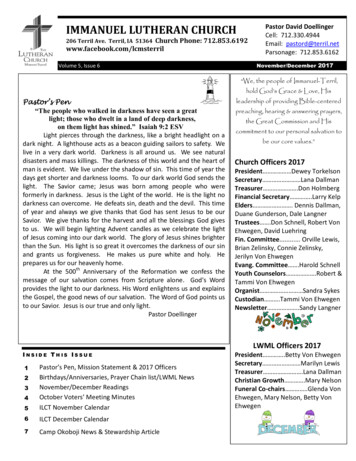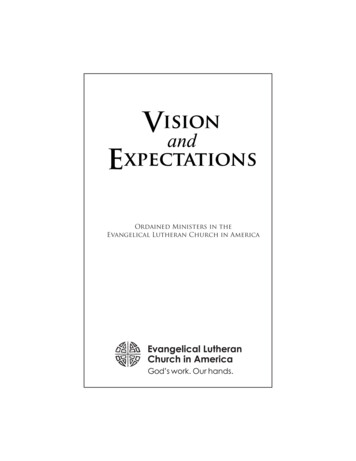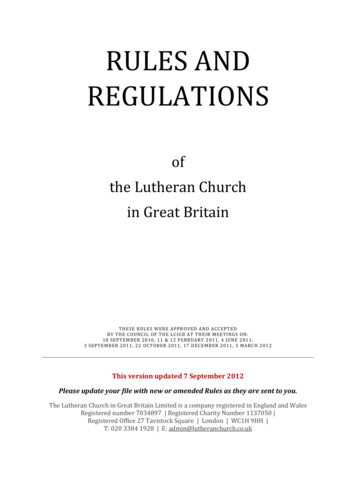
Transcription
RULES ANDREGULATIONSofthe Lutheran Churchin Great BritainTHESE RULES WERE APPR OVED AND ACCEPTEDBY THE COUNCIL OF TH E LCIGB AT THEIR MEE TINGS ON:18 SEPTEMBER 2010 , 11 & 12 FEBRUARY 2 011, 4 JUNE 2011,3 SEPTEMBER 2011, 22 OCTOBER 2011, 17 D ECEMBER 2011, 3 MARCH 2012This version updated 7 September 2012Please update your file with new or amended Rules as they are sent to you.The Lutheran Church in Great Britain Limited is a company registered in England and WalesRegistered number 7034897 Registered Charity Number 1137050 Registered Office 27 Tavistock Square London WC1H 9HH T: 020 3384 1928 E: admin@lutheranchurch.co.uk
CONTENTSLCiGB Statement of Faith . 3Congregations and their Membership in LCiGB. 5Individual Membership in a Congregation of the LCiGB . 8Understanding the Role of a Congregational Council Member (Trustee) . 9The Annual Synod . 14The Role of the Bishop . 16The Role of the Dean . 17The Role of the Ministerium . 19Code of Conduct for LCiGB Council Members (Trustees). 20The Role of the Pastor in an LCiGB Congregation . 23The Status and Role of a Pastor-in-Charge of a Congregation. 24Executive Committee . 25Theological Committee . 27Vocations Committee . 28Finance Committee . 33Responsibilities and Duties of Pastors within LCiGB . 35Disciplinary Procedure for Pastors of the Church . 37Licensed Clergy . 42Permission to Preach in LCiGB Congregations . 44Regulations & Procedures for Lay Ministers . 462Rules & Regulations of the LCiGB
LCIGB STATEMENT OF FAITHThe Lutheran Church in Great Britain confesses one Triune God, Father, Son and HolySpirit, our Creator, Redeemer and Sanctifier.1. This church confesses Jesus Christ, truly God and truly human, as Lord of theChurch and Saviour of the world. In Christ, God’s Word Incarnate, God revealsHis divine love to all sinful humankind. The proclamation of God’s graciousaction in Jesus Christ towards all of creation is Gospel or Good News to allhumanity. This Church holds that through the Gospel, God’s Holy Spirit calls andsustains the Church through the gift of faith. In this gift of faith God reconciles usto Himself and frees believers to live in love towards God, one another and allpeople.2. This Church acknowledges the Holy Scriptures as the sole norm for the faithand the life of the Church. The Holy Scriptures are the divinely inspired record ofGod’s redemptive act in Christ, for which the Old Testament prepared the wayand which the New Testament proclaims. In the continuation of thisproclamation in the Church, God still speaks through the Holy Scriptures andrealises His redemptive purpose generation after generation.3. This Church accepts the Three Ecumenical Creeds and the LutheranConfessions, especially the Unaltered Augsburg Confession, and Luther’s SmallCatechism, as pure expositions of the Word of God, and acknowledges as onewith it in faith and doctrine all churches that likewise accept the teaching ofthese symbols.4. This Church accepts the other symbolical books of the evangelical Lutheranfaith; i.e. The Apology of the Augsburg Confession, The Smalcald Articles,Luther’s Large Catechism and the Formula of Concord as further validinterpretations of the confession of this Church.5. This Church affirms that the Gospel is transmitted by the Holy Scriptures, towhich the creeds and confessions bear witness. It is the true treasure of theChurch, the substance of its proclamation and the basis of its unity andcontinuity. In both Word and Sacraments Christ comes to us, and the Holy Spiritcreates and sustains Christian faith and life; in Baptism we are incorporated intoChrist, and in Holy Communion Christ comes to us most personally and gives usforgiveness of sins, life and salvation.6. This Church affirms that as baptized Christians we are all children of God, atonce sinners and saints. We welcome each other as worshippers and servants ofChrist. We encourage all Christian people, having thus been incorporated into thepriesthood of all believers, to express their faith in the Church and in daily life.3Rules & Regulations of the LCiGB
7. This Church affirms the special ministry of proclamation of the Gospel in theApostolic tradition and administration of the Sacraments. Through the ministryof Word and Sacraments, exercised together with diaconal service, the Churchfulfils its divine mission and purpose.8. This Church affirms the call of the Gospel to unity, reconciliation and healing.We therefore commit ourselves to the pursuit of all that makes for unity withinthe One Body of Christ.9. This Church affirms the God-given human dignity of all people, rejoicing in thediversity of God’s creation. We commit ourselves to always struggle for justice,peace and the integrity of creation.4Rules & Regulations of the LCiGB
CONGREGATIONS AND THEIR MEMBERSHIPIN LCIGBDEFINITION OF A CONGREGATION1. A congregation is a community of baptised Christians who meet regularly for theproclamation of the Gospel and the administration of the Sacraments.2. A congregation will participate in the universal mission of God bya.b.c.d.e.f.Meeting regularly for worship, teaching and fellowshipWitnessing to the Gospel in the worldServing God’s creationProviding pastoral care for membersServing and ministering to the communityReflecting the love of God by proclaiming and living the Good News in thewider worldCONGREGATIONS WITHIN THE LCIGB1. Membership CriteriaThe Council and Synod of the LCiGB will receive into membership and maintainthe membership of those congregations that fulfil the following criteria. They:a. Gather regularly as a community around the Word and Sacramentsb. Accept and uphold the Statement of Faith of the Lutheran Church in GreatBritainc. Accept and uphold the Governing Documents (Constitution and Rules andRegulations) of LCiGBd. Accept and uphold as their own Constitution either the recommendedLCiGB Congregational governing documents, or governing documentsapproved by the Council of LCiGB as being consonante. Support the life and work of LCiGB through prayer and with goodstewardship of resources, time and talentsf. Call, employ or otherwise engage only pastors who are approved by theLCiGB in accordance with the LCiGB's constitution and rules.2. Functions of a congregation.Each Congregation of the Lutheran Church in Great Britain shall, as far as itsresources and abilities make it possible, carry out these functions:5Rules & Regulations of the LCiGB
a. Provide services of worship at which the Word of God is preached and theSacraments are administeredb. Provide pastoral care, and empower mutual care among its membersc. Enable all members to discern and carry out their own particular rolewithin the priesthood of all baptised believersd. Teach both adults and children through Bible studies, Confirmation andBaptism classes and other appropriate mediae. Encourage responsible and appropriate stewardship among membersf. Take part in the mission of the church through diaconal work (service andcare for the world) and response to human need (justice and peaceissues)g. Reach out to others, both people in the local geographical area andmembers of the community gathered around the congregation(confessional, cultural or linguistic)3. Governancea. Each Congregation of the Lutheran Church in Great Britain shallstructure and govern itself in such a way as to comply with legalrequirements, for example those concerned with charity, employmentand taxation law.RECEPTION OF NEW CONGREGATIONS, OR THOSE TRANSFERRINGMEMBERSHIP TO THE LUTHERAN CHURCH IN GREAT BRITAINCongregations shall be received into membership of LCiGB by the following process:a. The process will at all times be governed by the Memorandum andArticles of LCiGB, especially Articles 6-21, and the LCiGB’s Rules andRegulations.b. The Congregation shall write a letter to the Council of LCiGB, asking foradmission to membership, and providing the following information:i. Names and contact details for members of the CongregationalCouncilii. Accounts (unaudited) for at least the previous 12 monthsiii. Records of attendance at services for at least the previous 12monthsiv. Minutes of an authorised meeting approving the request to entermembership of LCiGBv. A record of voting and baptised members as defined in the Rules ofLCiGBvi. The name of an Appointed Representative for meetings of theSynod of LCiGBvii. Its governing documents6Rules & Regulations of the LCiGB
c. After LCiGB Council has assessed the application, Synod, after dueconsideration, will either approve or refuse to nominate the Congregationfor membership, and will inform the Council of its decision.d. The LCiGB Council will receive the Congregation into membership. In theevent of the refusal of LCiGB Council to approve a decision of Synod,Article 10 of the Articles of Association will be observed.TERMINATION OF MEMBERSHIPA Congregation’s membership of LCiGB may be terminated by LCiGB under the terms ofArticles 20 and 21. A Congregation may terminate its membership by the followingprocess:1. The Congregation shall hold a legally called and convened Special Meeting todiscuss the withdrawal, and shall vote by a two thirds majority of the votingmembers present to terminate its membership of LCiGB.2. The Council of the Congregation shall write to the Council of LCiGB, stating itsintent to withdraw from LCiGB, and the reasons for so doing.3. During a period of at least 90 days from receipt of the notification the Bishopand/or the Dean of LCiGB, or if appropriate the Officers of LCiGB, shall meet withthe Council and members of the congregation to discuss the reasons forwithdrawal and to try to find a path of reconciliation. The consequences for theCongregation must be clearly understood by all voting members and by theCouncil of LCiGB. During this period, times of mutual conversation andcounselling are encouraged.4. At the end of 90 days, the Congregation shall hold another legally called andconvened Special Meeting in the presence of the Bishop and/or Dean. The voteshall be held again, and if a two thirds majority again vote to leave LCiGB, theCongregation shall be deemed to have made its decision.If a congregation fails to fulfill any of the Membership Criteria stated above under'Congregations within the LCiGB', the LCiGB will take action in accordance with Article21, which may result in the termination of the congregation's membership in the LCiGB.7Rules & Regulations of the LCiGB
INDIVIDUAL MEMBERSHIP IN ACONGREGATION OF THE LCIGBVOTING MEMBER1. A voting member in a congregation of the LCiGB is a baptised person aged 18years or over who has publicly confessed the Christian faith after a period ofinstruction in the teachings of the Lutheran Church, based upon Luther’s SmallCatechism, and who has been duly received into membership of the congregationby its council.2. The council of the congregation will maintain a list of voting members andreview it before every Annual General Meeting, removing the names of thosewho have died and, at its discretion, those who have not supported the life andworship of the congregation over a significant period of time or in a mannerbefitting a faithful follower of Christ. The council will terminate votingmembership immediately if a person has resigned or formally transferredmembership to another congregation.3. Membership may be held in only one congregation of the LCiGB. Holding votingmembership in another non-LCiGB congregation, however, will not in itselfpreclude voting membership of a congregation of the LCiGB, provided that theteachings of the other congregation are compatible with those of the LutheranChurch.BAPTISED MEMBER1. A baptised member is a person who has been duly baptised in the name of theFather and of the Son and of the Holy Spirit. The council will maintain a list ofbaptised members of the congregation and review it before every AnnualGeneral Meeting, removing the names of those who have died and, at isdiscretion, those who have not supported the life and worship of thecongregation over a significant period of time or in a manner befitting a faithfulfollower of Christ.8Rules & Regulations of the LCiGB
UNDERSTANDING THE ROLE OF ACONGREGATIONAL COUNCIL MEMBER(TRUSTEE)The Lutheran Church in Great Britain (LCiGB) relies on members who volunteer theirtime, talents and energies to serve the church in various ways. Without the involvementof willing and capable people, the church would struggle to fulfil its mission. A veryimportant role in the church belongs to members of Congregational Councils, whoparticipate in the leadership of the LCiGB’ congregations and who bear considerableresponsibility.Persons elected or appointed to a Congregation’s Council in the LCiGB aretrustees of the charity whether it is registered officially or not (as well as directorsof the company if the congregation is so registered).Some people are disqualified by law from acting as trustees. All trustees will beexpected to sign and return to the Congregation and to the LCiGB the ‘Declaration ofeligibility for newly appointed trustees’, which is produced by the Charity Commissionand is attached to this document. Please read it carefully. If you have any questionsabout the meaning of the declaration, please raise these with your pastor and with theBishop or Dean.You are also asked to read carefully this document, Understanding the role of a memberof a Congregational Council (trustee) in the LCiGB. To confirm that you agree to serve asa trustee, please return two signed copies, one to the Chair of your CongregationalCouncil and one to the LCiGB office. Also keep a copy on your own file, as a record andreminder.1. ESSENTIAL RESPONSIBILITIES OF A TRUSTEETrustees of charities have specific legal responsibilities. The following list is taken from‘The essential trustee: What you need to know’, a publication of the Charity Commission(CC3):Charity trustees are the people who serve on the governing body of a charity. They may beknown as trustees, directors, board members, governors or committee members. Theprinciples and main duties are the same in all cases.(1) Trustees have and must accept ultimate responsibility for directing the affairsof a charity, and ensuring that it is solvent, well-run, and delivering the charitableoutcomes for the benefit of the public for which it has been set up.Compliance – Trustees must:(2) Ensure that the charity complies with charity law, and with the requirements ofthe Charity Commission as regulator; in particular ensure that the charity prepares9Rules & Regulations of the LCiGB
reports on what it has achieved and Annual Returns and accounts as required bylaw.(3) Ensure that the charity does not breach any of the requirements or rules set outin its governing document and that it remains true to the charitable purpose andobjects set out there.(4) Comply with the requirements of other legislation and other regulators (if any)which govern the activities of the charity.(5) Act with integrity, and avoid any personal conflicts of interest or misuse ofcharity funds or assets.Duty of prudence – Trustees must:(6) Ensure that the charity is and will remain solvent.(7) Use charitable funds and assets reasonably, and only in furtherance of thecharity’s objects.(8) Avoid undertaking activities that might place the charity’s endowment, funds,assets or reputation at undue risk.(9) Take special care when investing the funds of the charity, or borrowing fundsfor the charity to use.Duty of care – Trustees must:(10) Use reasonable care and skill in their work as trustees, using their personalskills and experience as needed to ensure that the charity is well-run and efficient.(11) Consider getting external professional advice on all matters where there maybe material risk to the charity, or where the trustees may be in breach of theirduties.2. FREQUENCY OF MEETINGS AND PREPARATIONFrom ‘The essential trustee: What you need to know’ (Section H, Duty of Care):[Trustees] must meet as often as needed to do justice to the affairs of the charity, and makewell-informed decisions. Trustees who do not meet often enough risk breaching their dutyof care .Giving adequate time and energy: Being a trustee will involve preparation forand attendance at trustee meetings, and often also at other meetings and functions. It isessential that trustees are able to devote enough time to these essential duties of being atrustee. This means they should be aware of their responsibilities and duties and howmuch time they will need to give .Running a charity can be complex and trustees need tobe up to date on the operating environment for their charity. This may involve widernetworking, taking up training opportunities, or reading the relevant newsletters orspecialist trade papers.3. CONFLICT OF LOYALTIES10Rules & Regulations of the LCiGB
Trustees of a congregation in the LCiGB have a duty to promote and protect theinterests of the congregation and those of the LCiGB. Any relationship that they mighthave with another group or another individual must not interfere with theirresponsibilities as a trustee of a congregation in the LCiGB.From ‘A guide to conflicts of interest for charity trustees’, published by the CharityCommission:Trustees should bear in mind that when they are dealing with the business of thecharity, their overriding duty is to act in the best interests of the charity. There maybe situations in which a trustees’ loyalty to the charity conflicts with their loyalty to thebody which appointed them, to another charity of which they are a trustee or to a memberof their family. Such conflicts of loyalty will not stop anyone from being a trustee, but theycan occasionally cause conflicts of interest.Any trustee who has a conflict of loyalties should declare this and it should be included inthe register of interests. They should also declare the interest at the beginning of anymeeting at which an issue is to be discussed that is subject to the conflict and should takeno further part in the discussions on the issue. This will help to ensure transparency andavoid any accusations of impropriety.4. COLLECTIVE RESPONSIBILITYFrom ‘The essential trustee: What you need to know’ (Section E, Trustees and theirresponsibilities):All decisions by the trustees concerning a charity are taken by all the trustees, actingcollectively and as a team. However, the decisions need not be unanimous; a majoritydecision is sufficient unless the charity’s governing document states otherwise . Subject toany power of delegation there is a general rule that trustees must take personalresponsibility for their decisions, and that all decisions concerning the charity must betaken by the trustees acting together .Trustees can always invite some of their number tolook into particular matters and make recommendations. The decision whether or not toact on the recommendations is for the trustees to take together.5. LIABILITIES OF TRUSTEESFrom ‘The essential trustee: What you need to know’ (Section I, What are the liabilities ofcharity trustees?):A conscientious and committed trustee need have few worries about personal liability. Butit is important for all trustees to understand their position .If trustees act prudently,lawfully and in accordance with the governing document, then any liabilities (ie debtsor financial obligations) that they incur as trustees can normally be met out of thecharity’s resources. However, if trustees incur liabilities or debts that amount in total tomore than the value of the charity’s assets they may not be able to cover themselves in fullout of the charity’s property, even if the liabilities have been properly incurred .If thetrustees act imprudently, or are otherwise in breach of the law or the governingdocument, the position is different. Here, trustees may be personally responsible forliabilities incurred by the charity, or for making good any loss to the charity. Since11Rules & Regulations of the LCiGB
trustees act collectively in running a charity, they will usually be collectivelyresponsible to meet any such liability .We can take proceedings in court for therecovery, from trustees personally, of funds lost to charity as a result of a breach of trust bythe trustees. However, there is only a small likelihood that trustees will have to pay out oftheir own pocket towards a financial loss suffered by the charity, or towards compensatinga third party who has suffered a financial loss as a result of their dealings with the charity.In cases where a breach of trust causes a loss to the charity, we can relieve trustees of theirliability to pay, provided they have acted honestly and reasonably .Different rules applyto the directors of charitable companies, as company law also applies; this confers limitedliability on trustee company directors. The general principles of prudence are, however,the same.Name of trustee:(print name)I confirm that I have read the information on these sheets and agree to act as a trusteeof the Congregation of the Lutheran Church in Great Britain, making my best efforts toserve in accordance with the expectations and principles outlined above.Signature:Date:Adopted as a rule at a meeting of the LCiGB Council held on 17.12.11Please note: the Charity Commission form “Declaration of eligibility for newlyappointed trustees” (form CSD 13-82) also forms part of this Rule. A Jpeg version of theform appears on the following page.12Rules & Regulations of the LCiGB
13Rules & Regulations of the LCiGB
THE ANNUAL SYNOD1. The Annual Synod of the LCiGB is a meeting of congregations or persons thathave been duly approved, elected or appointed and are entitled to vote at themeeting. The members of the Synod are:a. Congregations of the LCiGBb. All ordained pastors who have been approved by the LCiGBc. The board of trustees of the LCiGBd. Other individuals who have been nominated by synod and approved bythe board2. Congregations of the LCiGB must choose an Appointed Representative to voteand act on their behalf at synods and general meetings. Normally AppointedRepresentatives should serve in that capacity for three years but congregationsmay replace them sooner if necessary. The full name and current address of eachcongregation’s Appointed Representative must notified to the LCiGB. Only thosepersons whose names and addresses have been notified to the LCiGB at least 30working days before a Synod or other general meeting will be entitled to attendand vote at the meeting.The Annual Synod consists of two parts:1. THE ANNUAL GENERAL MEETING1. An annual general meeting (AGM) must be held each year, at a time and placeapproved by the board of trustees. Annual general meetings are a constitutionalrequirement for the LCiGB.2. At the annual general meeting, members of the Synod (including AppointedRepresentatives of congregations) will:a. Elect trusteesb. Receive the trustees’ annual report and the audited or examined accountsc. Appoint an auditor or examiner or authorise the board to do sod. Authorise the trustees to fix the remuneration of the auditore. Approve amendments to the Memorandum or Articles of Associationf. Vote on duly submitted resolutionsg. Advise the trustees14Rules & Regulations of the LCiGB
3. Resolutions from members may be considered at any annual general meeting,provided that they have been duly requested (as required by the Companies Act).Members representing 5% of the voting rights may request that a writtenresolution be circulated to members and be put to the AGM; they may circulate astatement of up to 1000 words about any resolution. The signed resolution andstatement must be delivered to the registered address of the LCiGB at least sixweeks before the AGM at which it is to be proposed. The resolution andstatement must then be circulated with the notice of the meeting.2. THE CHURCH SESSION1. The Church Session will consider the spiritual programme and leadership of theLCiGB, which is the constitutional responsibility of the bishop, the dean and thesynod.2. Its regular agenda will include:a. Worshipb. Theological issuesc. Outreach, missions & serviced. Training of pastors and other ministerse. Congregational developmentsf. Communicationsg. Relationships with other Lutheran churchesh. Ecumenical relationshipsi.Other matters pertaining to the spiritual growth of the LCiGBSPECIAL GENERAL MEETINGS1. Special general meetings may be called by the board of trustees at any time or bythe written request to the trustees of at least 10 members of the Synod or 10 %of the membership of Synod, whichever is the greater. The request must statethe nature of the business to be discussed. If the trustees fail to hold the meetingwithin 28 days of the request, the members may call a special general meeting.In so doing, they must comply with the provisions of the Articles of Association(Articles 22-66 on General Meetings).15Rules & Regulations of the LCiGB
THE ROLE OF THE BISHOPELECTION1. The Bishop shall be elected by a majority of the Members of Synod. All Ministers ofthis Church who have been ordained for five years or more and are eligible to becalled as the senior pastor of a congregation shall be eligible to stand for election.The term of office for the Bishop shall be six years. After being elected, the Bishopshall be given documents of Call and shall be episcopally consecrated and installedat a Service of Worship. In the event of successive re-election the Bishop shall notbe re-installed.ROLE2. Within the one Ministry of Word and Sacrament, the Bishop shall have the specialfunction of providing care, counsel and oversight to the ordained Ministers andcongregations of the Church in matters spiritual and temporal.3. As a trustee and director of the Church, with legal responsibilities under charity andcompany law, the Bishop will ensure that all of his o
RULES AND REGULATIONS of the Lutheran Church in Great Britain THESE RULES WERE APPROVED AND ACCEPTED BY THE COUNCIL OF THE LCIGB AT THEIR MEETINGS ON: 18 SEPTEMBER 2010, 11 & 12 FEBRUARY 2011, 4 JUNE 2011, 3 SEPTEMBER 2011, 22 OCTOBER 2011, 17 DECEMBER 2011, 3 MARCH 2012 This version updated 7 September 2012
